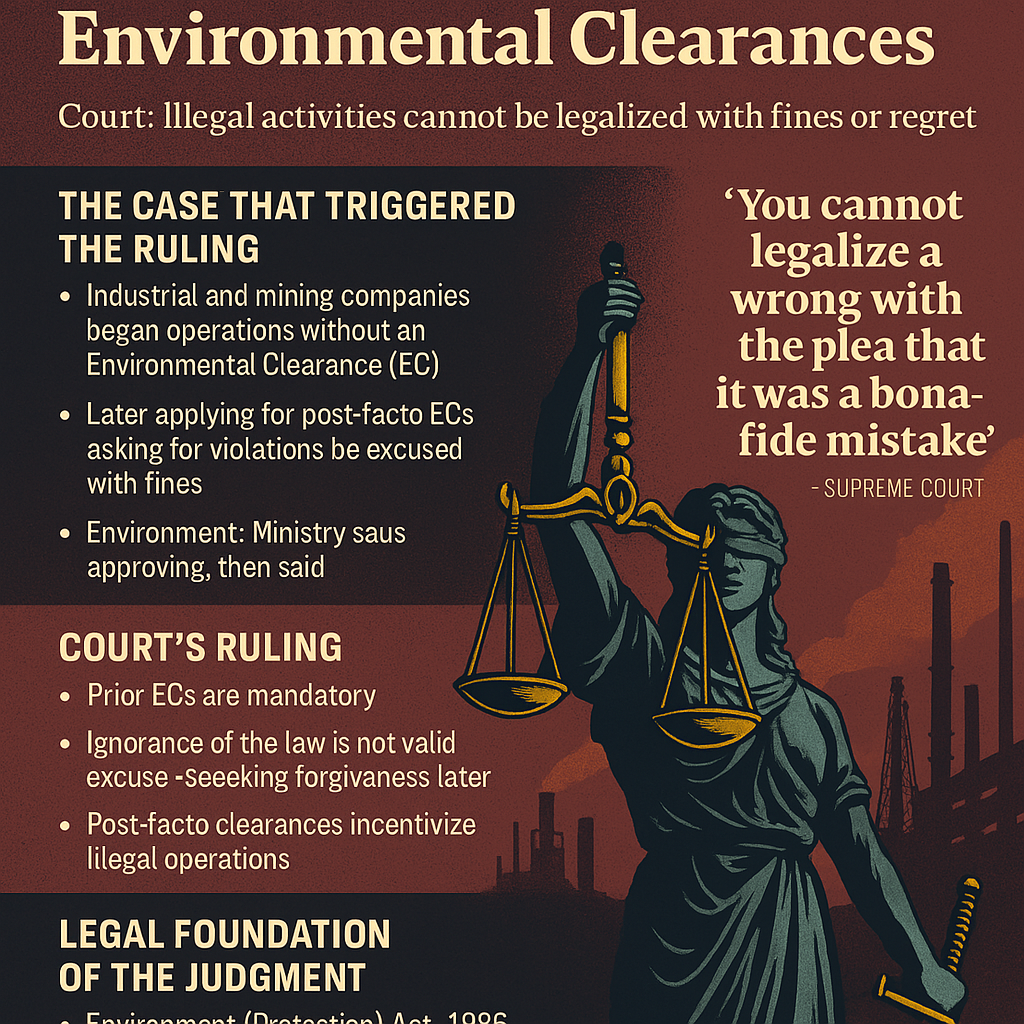
Supreme Court Says No to Ex Post Facto Environmental Clearance: Law Can’t Be an Afterthought
In a landmark judgment delivered in March 2025, the Supreme Court of India issued a firm reminder to industries, regulatory bodies, and government ministries: violating environmental laws cannot be excused retroactively. The apex court has ruled that ex post facto environmental clearances (ECs)—that is, permissions granted after a project has already begun without due approval—are not legally valid, reinforcing the foundational principles of India’s environmental protection framework.
The Case at a Glance
The case involved multiple petitions filed by industrial and mining companies that had initiated construction or operational activities without first obtaining the mandatory Environmental Clearance as required under Indian law. These companies later approached the Ministry of Environment, Forest and Climate Change (MoEFCC) seeking ex post facto clearance, arguing that they were willing to pay penalties and follow compliance protocols going forward.
The MoEFCC, in several instances, granted such post-facto clearances in the past, claiming that as long as a project eventually complied with environmental standards, it could be allowed to proceed.
But this time, the matter reached the Supreme Court—and the bench unequivocally refused to condone such practices.
What the Supreme Court Said
The Court’s verdict stressed that environmental clearance must be obtained before the commencement of any project, as laid out in the Environment Impact Assessment (EIA) Notification of 2006. It ruled that:
• “Prior Environmental Clearance is a legal prerequisite and not a mere procedural formality.”
• “Permitting post-facto ECs undermines the deterrence built into environmental law and would embolden violators to flout regulations and seek forgiveness later.”
• “Environmental law is not about box-ticking—it is about protecting public health, biodiversity, and inter-generational equity.”
The court also criticized the government’s approach of allowing violations to be “regularized” through penalty payments, calling it “arbitrary and unconstitutional.”
Legal Basis for the Verdict
The ruling draws strength from several foundational statutes and constitutional provisions:
1. Environment (Protection) Act, 1986 – The primary legislation for safeguarding India’s environment. It mandates that no industrial activity can begin without prior clearance from designated authorities.
2. EIA Notification, 2006 – This regulation explicitly states that environmental impact assessments must be conducted, and clearances must be obtained before project commencement.
3. Article 21 of the Constitution – The Right to Life, as interpreted by the Supreme Court, includes the right to a clean, safe, and sustainable environment.
What This Means for Industries and Regulators
This ruling sends a strong message to industrial houses, infrastructure developers, and mining companies: Environmental compliance is not optional. Those that begin construction or operations in violation of EIA rules cannot expect leniency from courts in the name of economic development or employment generation.
Key implications include:
• No more post-facto legal cover: Projects that start without EC now risk closure, demolition, or heavy penalties.
• Accountability for regulators: State Pollution Control Boards (SPCBs) and local environmental authorities will now face increased judicial scrutiny if they are found complicit in permitting illegal operations.
• Tighter compliance expected: Developers and investors must now invest more in pre-project legal assessments, environmental due diligence, and robust documentation.
Broader Significance
This verdict aligns India with global environmental norms that emphasize the precautionary principle—which demands that environmental risk assessments must be conducted before harm is done. It also supports the polluter pays principle, which holds that those who damage the environment must bear the costs.
Legal experts have called the ruling “a bold and much-needed stand” in an era where rapid industrialization often overshadows environmental accountability.
As India balances its development goals with sustainability commitments, the Supreme Court has reaffirmed that the environment cannot be an afterthought.












comments